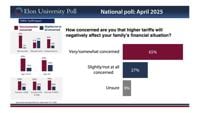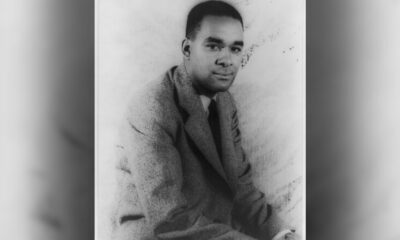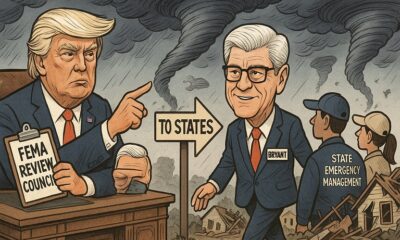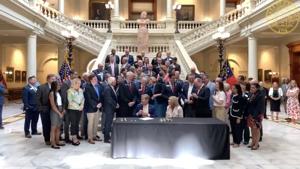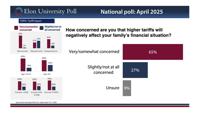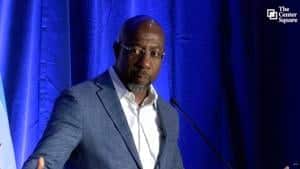(The Center Square) – Georgia Gov. Brian Kemp on Monday signed a series of education bills, including the Riley Gaines Act of 2025 designed to protect women’s sports.
Senate Bill 1, bars males and females from competing on teams designated for the opposite gender, the governor’s office said in a statement. It also requires restrooms and changing areas that can be used by more than one student to be limited to one gender.
The legislation is in line with President Donald Trump’s executive order entitled “Keeping Men Out of Women’s Sports.” More than half the states in America have similar legislation, many named for Gaines.
Other educations bills signed into law include one providing financial grants as incentives to local boards of education to approve charter school petitions and prohibiting school systems from unfairly attempting to shut down charter schools.
“As the parents of three daughters, Marty and I know just how important it is to keep our children safe and to give them the best possible start in life,” Kemp said in a statement. “Girls should not have to share a playing field, a restroom, or a locker room with boys and vice versa, and the commonsense legislation I signed today is about what is fair and safe for our children.
“I want to thank the members of the General Assembly for putting the well-being of our students over politics. Like Marty and me, they want to protect their daughters and sons, they want them to grow up and compete in a fair environment, and they want their children to know that political agendas won’t dictate their lives.”
The Riley Gaines Act is named after the former University of Kentucky All-American swimmer who has championed the cause of keeping males out of female sports. It was in the 2022 NCAA Championships in Atlanta, hosted by Georgia Tech, where a Penn swimmer previously spending three years on the men’s team encountered Gaines and other women swimmers sparking multiple litigations – and the fight to protect women’s spaces.
“Three years after I, and dozens of other Division I female athletes, were forced to compete against a man in a Georgia pool, the Riley Gaines Act of 2025 is now law,” Gaines said in a statement Monday. “It’s an honor of a lifetime to know our stories help shed light on a grave problem of rampant gender ideology that means women are victims of government facilitated sex discrimination.”
GLAAD, a nonprofit organization focused on queer advocacy and cultural change, is critical of the Georgia legislation.
“All students, regardless of gender identity, should have access to play school sports in a safe environment where they can learn and thrive,” CEO Sarah Kate Ellis said in a statement Monday. “With the passage of this discriminatory legislation, Georgia lawmakers have unfairly and baselessly made it more difficult for transgender students to experience the same lessons sports offers all youth, and they have dangerously placed a target on cisgender girls who don’t fit neatly into societal expectations of gender.”
The legislation was sponsored by Sen. Greg Dolezal and carried in the House by Rep. Josh Bonner. It was a legislative priority for both Speaker of the House Jon Burns and Lt. Gov. Burt Jones.
“Today, the General Assembly affirmed our longstanding and ongoing commitment to the safety, success, and well-being of Georgia’s children,” Burns said. “Our children are our future, and their future begins in our education system. That’s why securing our classrooms, strengthening school safety, and increasing access to mental healthcare for our students was a top priority for the House this session, and that’s exactly what HB268 accomplishes. The House also took a stand to restore common sense and fairness for female athletes by championing the Riley Gaines Act. Thanks to the protections set forth by this legislation, female athletes here in Georgia will never be forced to face a biological male on the court, on the field, or in the locker room.”
Also signed by Kemp:
• House Bill 81, sponsored by Rep. Bethany Ballard and carried by Sen. Larry Walker in the Senate, establishes an interstate compact for school psychologists, helping ease the burden on these essential employees in our schools.
• HB307, sponsored by Ballard and carried by Sen. Billy Hickman in the Senate, builds on the work of the Georgia Early Literacy Act by consolidating existing statutory requirements on dyslexia screening so that we can reach students earlier and get them the assistance they need.
• HB235, sponsored by Rep. Rick Townsend and carried in the Senate by Sen. Mike Hodges, entitles public school employees and postsecondary education employees to receive a leave of absence for donation of bone marrow or organs.
• SB82, sponsored by Sen. Clint Dixon and carried by Rep. Scott Hilton in the House, incentivizes local boards of education to approve charter school petitions while preventing school systems from unfairly attempting to shutter these school options.
• SB123, sponsored by Senate President Pro Tempore John Kennedy in and carried by Rep. Matt Dubnik in the House, requires school systems with chronic absenteeism rates of 10% or more to establish an attendance review team to determine the underlying causes of that issue.
• HB268, sponsored by Rep. Holt Persinger and carried by Sen. Bill Cowsert in the Senate, was also a top priority of Jones, Burns and many others in the General Assembly. This bill requires schools to have up-to-date mapping and mobile panic alert systems, requires student records be transferred within five school business days so potential dangers can be addressed quickly, provides for a student advocacy specialist grant program to reimburse districts for hiring said position, requires local boards to offer an anonymous reporting program, and creates the offenses of “terroristic threat of a school” and “terroristic act upon a school.”
These measures are in addition to the multiple rounds of school safety grants provided for in prior years, annualized funding for school safety grants, and legislation requiring schools conduct safety audits.
This content presents legislation signed by Georgia Governor Brian Kemp focused on restricting transgender participation in women’s sports and promoting charter schools. The framing of the legislation, including quotes from Republican officials and Riley Gaines, supports the conservative stance of protecting “women’s sports” and opposing “gender ideology.” The criticism from organizations like GLAAD reflects opposition from more progressive circles, highlighting the controversy of the bills. The emphasis on fairness, safety, and the endorsement of prominent conservative figures places the article closer to a center-right perspective.

